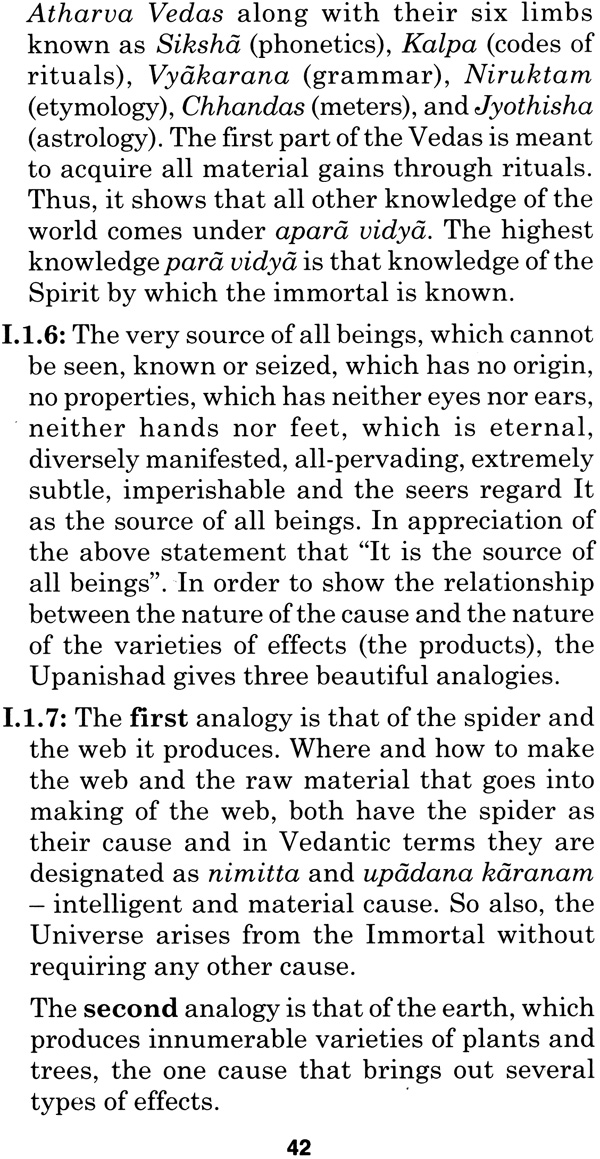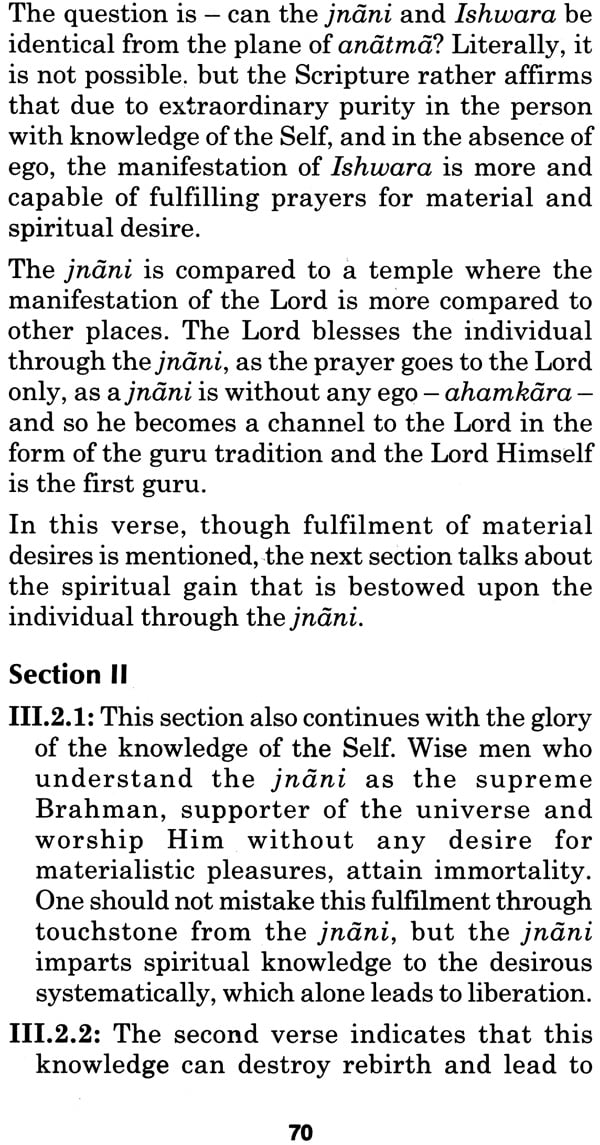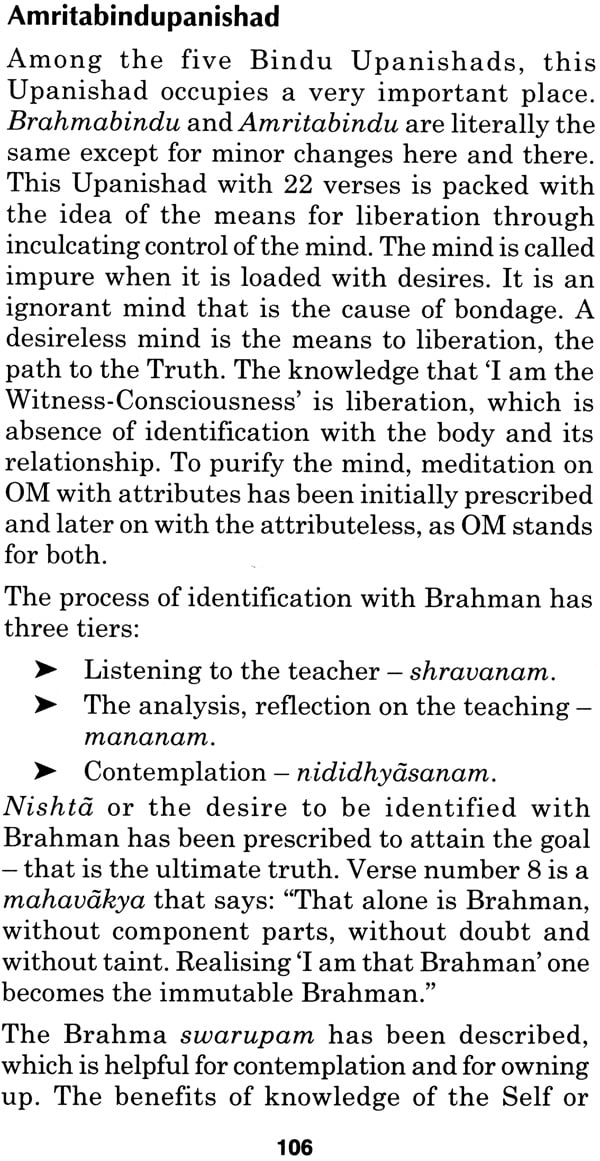
Know The Upanishads (Plus Verses from The Vedas and The Bhagavad Gita)
Book Specification
| Item Code: | NAK182 |
| Author: | Ramanuj Prasad |
| Publisher: | V&S PUBLISHERS, Delhi |
| Language: | English |
| Edition: | 2010 |
| ISBN: | 9788122308310 |
| Pages: | 130 |
| Cover: | Paperback |
| Other Details | 8.5 inch x 5.5 inch |
| Weight | 180 gm |
Book Description
Like the proverbial fish that has heard a lot about the great Ocean and spends an entire lifetime searching for it, not realising it has always been an inseparable part of the ocean, man spends his lifetime searching all around for God. All man has to do, in fact, is simply turn his gaze inwards to realise that God or the Self has always been an inseparable part of him.
The Upanishad tells man that he is not a mere mortal, but a part of the Immortal one. Know the Upanishads shows you just how to go about uncovering the layers of ignorance and illusion to realise your true nature- the Self. This is the path to moksha or nirvana (liberation), which every seeker wishes to tread upon in order to break the cycle of birth and death.
With pearls of wisdom from the Upanishads, the Vedas and the Bhagavad Gita, this book could transform your way of life forever, teaching you the true meaning of existence.
Born in 1936, Ramanuaj Prasad has been associated with spiritual houses such as the Sri Ramakrishna Mission, Arsha vidya Gurukula, Narayana Gurukulam and Yogoda Satsang society. Introspection and logical thinking led to the author producing many professional papers and case studies. An ardent believer in Vedanta Vedantic Truth Revealed was his first book, published by Pustak Mahal. He has also composed about a dozen poems on Vedantic themes.
The author has been blessed with multi discipline academic records in Economics, Engineering and Management. Having served government and public sector institutions for around 40 years, he retired as a senior executive in 1994.
The Upanishads are the very quintessence of Indian wisdom, the blossoms of the finest thoughts gleaned from the dialectical relationship of wisdom teachers and their diligent students the Guru Shishya Parasparyam.
Though the Upanishadic lore has been known in India for centuries, it is only in recent times that the teaching came to be known the non Sanskrit speaking world. One of the earliest translations of the Upanishads was into Persian with the assistance of pundits from Benares at the behest of Prince Dara Shikoh in 1657. The Persian version was subsequently translated into the Latin Oupenkhat by Anquetil Duperron in 1802. The teachings of the Upanishads became known in Europe through the German translation done by Franz Mischel in 1882.
Today we live in an unprecedented age where knowledge has overcome all past boundaries. More people are educated now than ever before. But the complexities of life along with deep anxiety and uncertainty have vitiated the joy and new found freedom. It is as if mankind is navigating through uncharted waters. These circumstances make the teachings of the Upanishads very relevant and valuable to reorient our lives in a correct manner with a proper structure of Values.
The teachings of the Upanishads clearly state the goal and purpose of life. They promise deliverance from ignorance and the associated pain and suffering. Unalloyed happiness is gained by the proper understanding of one's own true nature, as well as that of the world in which we live. The philosophy of Vedanta, which is based on the teachings of the Upanishads, begins with two questions: ko aham? (Who am I?) and Kuto jagat? (Whence this World?). The teachings of the Upanishads give an enduring and convincing answer to these fundamental questions and bestow great peace of mind.
We are fortunate that in the author, Ramanuj Prasad, we have a well – disciplined academic mind along with mature understanding and original thinking. He has competently and systematically explained the teachings of Upanishads by taking one of the finest, the Mundaka, as his theme. He has also given apt references from other major Upanishads like the Brihadaranyaka, Kena, Svetasvatara adn Katha to show the underlying unity of Brahma vidya, or the Science of the Absolute. The Mundaka Upanishad has evolved from the Atharva Veda, which is also the source of other highly mystical Upanishads like the Prasna. In Mundaka Upanishad Guru Angiras instructs the ascetic Shaunaka on "that knowledge on knowing which nothing remains to be known".
With this highest of teachings as his subject, Ramanuj Prasad has kept the common reader in mind. For centuries, the Upanishadic treasure of wisdom has been confined to very few people. With its clear logical presentation this book will render sterling service in spreading the sublime teachings of the Upanishads to all readers. The aspirant seeking wisdom as well as the scholarly person keen to deepen his or her understanding of the Upanishads will benefit from this book.
There is a verse signifying that most of the functional instincts between human beings and animals are common – such as hunger, thirst, fear and Procreation. What is exclusive to humans is the power of thought. Human beings can think clearly, analyse a situation objectively and appropriate measures for a better future, whereas animals have no faculty to think and choose. Their behaviour is programmed and no improvement is possible under the laws of nature.
If one interviews people at the New Delhi Railway Station or the inter-state bus terminus and asks what made them come there at that point of time, there will be as many answers as the individuals questioned. One may say he is going to the office, another to the parliament session, the third to meet the President or to visit the RTO office, hospital school, library, Rajghat and so on and so forth. It will appear that there are innumerable objectives being pursued by human beings. But if little more thought is given to these multifarious activities, one can see that all lead to one common goal: the perennial search for happiness.
Without any doubt, all activities are means to happiness and may not be pursued if they resulted in pain or discomfort. This is true even in the case of one's wife, husband, son, daughter and a host of other relatives and related objects who or which are all means only. The lineage of the family, one proudly claims to belong to, is also a means to happiness only. The objectives enumerated so far are external to one, come to join at a point of time and similarly leave too. Therefore whatever happiness we get out of them is dependent on the source, which is not the inner part of the self as heat in the fire but like the beat of the water.
The happiness that comes from external objects is borrowed. The only internal happiness is the independent one, which is the very nature of human beings. Happiness that comes from external objects will certainly vanish and this threat always exists. The external sources of happiness are governed by many conditions that have to be fulfilled for enjoying happiness. One has to work hard to fulfil them in order to be happy occasionally. Whenever the conditions are not fulfilled, they leave a trail of pain proportionate to the happiness one got out of it. In fact, there is no pleasure from external sources but simply a rearrangement of the problem much like the relief felt after shifting a load from one shoulder of the other.
With concern, compassion and love equal to that of thousands of mothers, the Veda (Scriptures) promises assistance for both types of happiness that born out of external objects or that which is that intrinsic nature of every human being. The choice is left to the individual. The Veda never forces anyone to choose either, but cautions that all pleasures dependent on anything are temporary, unreal and also a source of pain in equal measure.
The first portion of the Veda contains rituals to attain worldly happiness and is capable of fulfilling whatever desire one has, be it for a son, wealth, wife, fame, complexion, etc, all of which can be attained through karma and rituals. However the end part of the Veda insists on renunciation of all worldly possessions and desires – the 'less luggage, more comfort' principle. Its concern is in the discovery of the Self just like the lost prince who was not aware of the fact that he was a prince and had to be told; "You are a prince of this kingdom; arise to claim your own glory.
| Foreword | 7 |
| Invocation | 10 |
| Introductio | 12 |
| Shanty Patha | 24 |
| Topic – 1 | |
| Upanisshads Explained | 27 |
| Topic 2 | |
| Whom the Upanishads Address | 31 |
| Topic – 3 | |
| Mundakopanishad | 38 |
| Topic – 4 | |
| Principal Upanishads | 78 |
| Ishavasya Upanished | 78 |
| Kenopapanishad | 79 |
| Kathopanishad | 80 |
| Prashnopanishad | 81 |
| Mandukyopanishad | 82 |
| Aitereyopanishad | 84 |
| Tattiriya Upanishad | 85 |
| Chhandogya Upanishad | 86 |
| Brihadaranyaka Upanishad | 87 |
| Topic 5 | |
| Important Verses | 90 |
| Topic 6 | |
| The Minor Upanishads | 102 |
| Paramahamsopanishad | 103 |
| Atmopanishad | 104 |
| Amritabindupanishad | 106 |
| Tejabindupanishad | 107 |
| Sarvasara Upanishad Atharva Veda | 108 |
| Brahmopabishad – Atharva Veda | 113 |
| Aruni Upanishad – Sama Veda | 114 |
| Kaivalya Upanishad – Atharva Veda | 115 |
| Shvetasvatara Upanishad – Krishna Yajurveda | 116 |
| Narayana Upanishad – Krishna Yajurveda | 118 |
| Vajrasuchi Upanishad – sama Veda | 119 |
| Muktikopanishd – Shukla Yajurveda | 120 |
| Atmabodha Upanishad – Rig Veda | 122 |
| Topic – 7 | |
| Upanishads in Vogue | 124 |
| Bibliography | 128 |
| Glossary | 129 |








